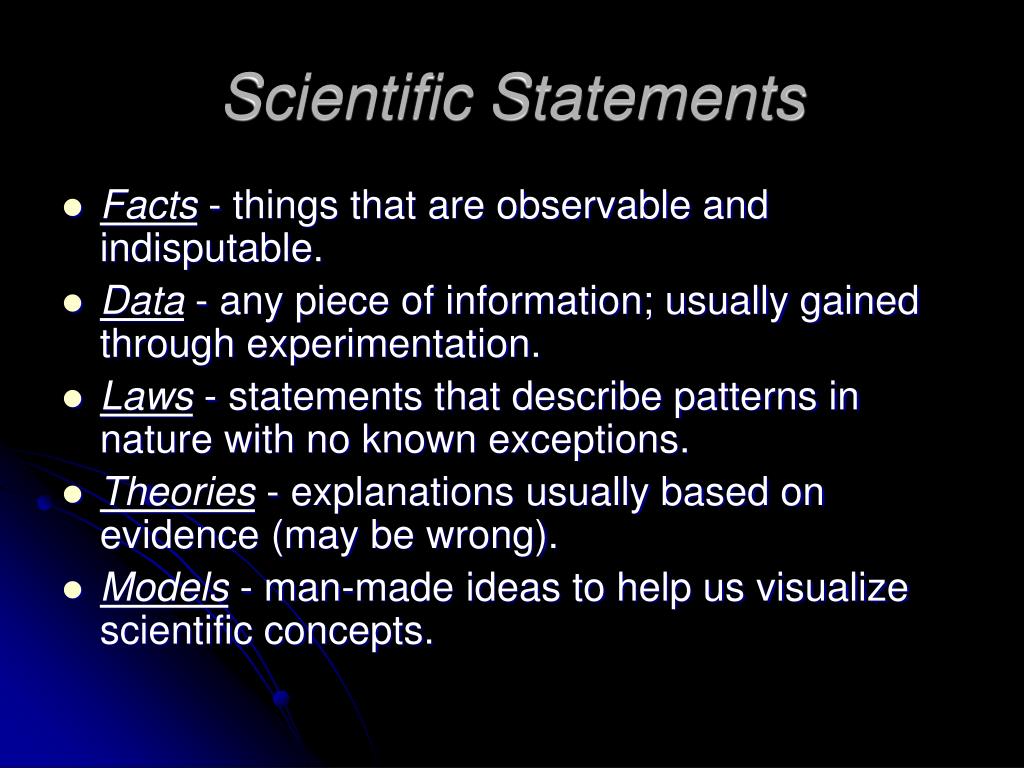Which Of The Following Is A Scientific Statement

In an era defined by rapid technological advancement and an overwhelming influx of information, the ability to discern a scientific statement from conjecture, opinion, or misinformation has become paramount. The question of "Which of the following is a scientific statement?" is not merely an academic exercise, but a critical skill for navigating complex issues ranging from public health to environmental policy.
Understanding what constitutes a scientific statement is crucial for informed decision-making. It affects how we interpret research findings, evaluate claims made by experts, and ultimately shape our understanding of the world around us. This article will explore the core tenets of a scientific statement, highlighting the criteria that distinguish it from other forms of assertion.
Defining a Scientific Statement
At its core, a scientific statement is an assertion about the natural world that is based on empirical evidence and is potentially falsifiable. This means that the statement must be testable through observation or experimentation, and that there must be a possibility of proving it wrong. Without these two key elements, a statement cannot be considered truly scientific.
The concept of falsifiability, popularized by philosopher Karl Popper, is particularly important. It emphasizes that a scientific statement should not be so vague or all-encompassing that it can explain any possible outcome. A truly scientific statement makes specific predictions that can be tested and potentially disproven.
Key Characteristics
Several characteristics further define a scientific statement. These include being objective, empirical, and reproducible.
Objectivity means that the statement should be based on facts and evidence, rather than personal opinions or beliefs. While scientists may have their own biases, the scientific method is designed to minimize their influence on the results of research.
Empirical evidence is crucial. Scientific statements must be supported by observations or data collected through experiments or other forms of systematic investigation. This evidence should be publicly available and open to scrutiny by other scientists.
Reproducibility is another cornerstone. Scientific findings must be repeatable by other researchers using the same methods. This ensures that the results are reliable and not due to chance or error. Lack of reproducibility often casts doubt on the validity of a scientific claim.
Distinguishing Scientific Statements from Other Claims
It is important to differentiate scientific statements from other types of claims. This is a skill that can be developed with practice and a critical mindset.
Opinions are personal beliefs or judgments that are not necessarily based on evidence. While opinions can be informed by facts, they are ultimately subjective and cannot be proven or disproven scientifically.
Beliefs, especially religious or philosophical ones, often involve faith and cannot be tested empirically. These beliefs may provide meaning and purpose, but they fall outside the realm of scientific inquiry.
Pseudoscientific claims often mimic the language of science but lack the rigorous methodology and evidence. These claims may rely on anecdotal evidence, cherry-picked data, or untestable assertions.
For example, the statement "Vaccines cause autism" has been repeatedly disproven by numerous scientific studies. It lacks empirical evidence and is therefore not a scientific statement, even though it has been widely circulated.
Examples of Scientific Statements
To illustrate the concept, here are a few examples of scientific statements:
"The Earth revolves around the Sun." This statement is supported by astronomical observations and physical laws.
"Increased levels of greenhouse gases in the atmosphere contribute to global warming." This is based on climate data and established scientific principles.
"Specific genetic mutations are associated with an increased risk of developing certain diseases." This is supported by genetic research and epidemiological studies.
These statements are all testable, falsifiable, and supported by empirical evidence.
The Importance of Critical Thinking
Developing the ability to identify scientific statements is an essential component of critical thinking. It requires evaluating the evidence, considering alternative explanations, and being skeptical of claims that lack supporting data.
In today's information age, where misinformation can spread rapidly, the skill of discerning scientific statements is vital for informed decision-making. This is especially true when dealing with complex issues such as climate change, public health, and technological advancements.
By understanding the characteristics of a scientific statement, individuals can better navigate the information landscape and make informed choices based on evidence rather than opinion or unsubstantiated claims.
The Role of Education and Science Communication
Education plays a crucial role in fostering scientific literacy and the ability to identify scientific statements. Science education should emphasize the scientific method, critical thinking skills, and the importance of evidence-based reasoning.
Effective science communication is also essential. Scientists and science communicators must be able to explain complex concepts in a clear and accessible manner, making it easier for the public to understand and evaluate scientific claims.
By promoting scientific literacy and effective science communication, society can empower individuals to make informed decisions and engage in meaningful discussions about important scientific issues.
Conclusion
In conclusion, a scientific statement is an assertion about the natural world that is based on empirical evidence, is testable, and is potentially falsifiable. It is objective, empirical, and reproducible, distinguishing it from opinions, beliefs, and pseudoscientific claims.
The ability to identify and evaluate scientific statements is essential for informed decision-making in an increasingly complex world. By fostering scientific literacy and critical thinking skills, society can empower individuals to navigate the information landscape and make choices based on evidence and reason.
Ultimately, understanding what constitutes a scientific statement is not just about understanding science; it's about understanding how to think critically and make informed decisions in all aspects of life.















![Which Of The Following Is A Scientific Statement [ANSWERED] Identify the scientific law from among the following - Kunduz](https://media.kunduz.com/media/sug-question-candidate/20220502223500422473-4564210.jpg?h=512)
